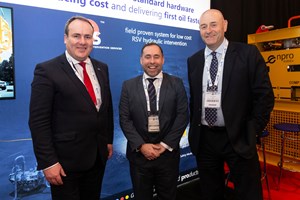$1.9 million investment in Enpro technology supports business growth

ABERDEEN -- Aberdeen-based production optimization specialist Enpro Subsea has announced that the $1.9 million (£1.5million) investment project in its Flow Intervention Services (FIS) technology, which included a $977,800 (£755,000) research and development grant from Scottish Enterprise, has started onshore testing ahead of planned subsea field trials later this year.
The company had previously developed a lower pressure, 10,000 psi, version of their tool and this investment has allowed them to develop the higher rated, 15,000 psi, version, extending its operating capabilities to support high pressure wells, common in Gulf of Mexico.
To date their 10k pressure version of FIS has provided well stimulation for multiple campaigns in West Africa. The system has been proven to improve production, by stimulating the reservoir and increasing the ultimate recovery from existing subsea wells.
Scottish Government minister for Energy, Connectivity and the Islands, Paul Wheelhouse MSP and David Rennie Scottish Enterprise’s head of Energy and Low Carbon Technologies, viewed Enpro’s FIS 15,000 psi technology first-hand at Subsea Expo 2019 in Aberdeen.
Ian Donald, Enpro Subsea managing director said, “Our vision is to develop a range of production technologies and services which increase production and oil recovery from our client’s assets. The investment combined with R&D funding from Scottish Enterprise in 2017 provided us with the ideal opportunity to increase our capabilities in the deepwater intervention arena, building on our success to date.
“We are seeing more adoption for the Flow Access Modules (FAM) production and the FIS intervention systems, from the smaller independent operators as well as the larger E&P firms. We have outlined some of these results to Mr. Wheelhouse, Scottish Enterprise and visiting delegates today.
“The development has taken a lot of hard work and perseverance to deliver this level of success for a new technology during a downturn period. It’s been down to the commitment and engineering skills of our team combined with the support and co-operation of our clients.”
Mr. Rennie added, “We initially supported this project back in 2017 and it’s great to hear that it’s now being tested onshore with a view to subsea testing this year. Projects like these are a fantastic example of how our support can make a difference to a company. Support for R&D is a key element of our subsea engineering action plan, with innovation support highlighted as a key priority. Subsea engineering is one of Scotland’s true global strengths and projects like this can only help reinforce that position.”
Together with its other key technology, FAM, the company provides operators flexibility development strategy throughout the life of field of its assets by enabling production enhancing technologies such as metering, flow assurance, data acquisition and hydraulic intervention to be used on standard subsea hardware.
The company uses this ‘smart standardization’ to link with existing subsea infrastructure, Xmas trees and manifolds, and return significant cost savings during well operations compared with alternatives.


